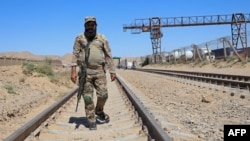Taliban-ruled Afghanistan and neighboring Turkmenistan on Wednesday marked the resumption of work on a long-delayed gas pipeline designed to run through the two countries, Pakistan and India.
The estimated $10 billion Turkmenistan-Afghanistan-Pakistan-India, or TAPI, project is designed to annually transport up to 33 billion cubic meters of Turkmen natural gas from the southeastern Galkynysh field through the proposed 1,800-kilometer pipeline.
Prime Minister Mohammad Hassan Akhund of the de facto Taliban government traveled to the Turkmen border region of Mary and joined top leaders of the host country to inaugurate construction of a vital section of the TAPI project. It is intended to link the city of Serhetabat in Turkmenistan to Herat in western Afghanistan.
Turkmen President Serdar Berdimuhamedov joined and addressed the ceremony via video link. "This project will benefit not only the economies of the participating countries but also the entire region,” he said.
Taliban authorities declared a public holiday in Herat, the capital of the province of the same name, to mark the occasion, with posters celebrating the TAPI project plastered across the border city.
Initially signed in the early 1990s to provide natural gas to energy-deficient South Asia, the TAPI project has faced repeated delays due to years of Afghan hostilities, which ended in 2021 when the then-insurgent Taliban recaptured power as all U.S. and NATO forces exited the country.
While Turkmen leaders Wednesday pledged to enhance bilateral ties between Ashgabat and Kabul and carry forward the TAPI project, experts remain skeptical that the gas pipeline will become operational soon. They cite funding issues, U.S.-led Western economic sanctions on Afghanistan and the international community’s refusal to recognize the Taliban as the legitimate government over restrictions on Afghan women’s rights.
Islamabad’s persistent diplomatic and military tensions with New Delhi are also considered a significant obstacle to the materialization of the TAPI project.
According to officials of the participating countries, Pakistan and India, each one plans to purchase 42% of the gas exports, and Afghanistan will receive the rest. Kabul will also earn around $500 million in transit fees annually.
Pakistan’s relations with Afghanistan deteriorated after the Taliban takeover over terrorism concerns. Islamabad complains that Kabul shelters and facilitates fugitive anti-Pakistan militants to orchestrate cross-border terrorist attacks from Afghan sanctuaries, charges the Taliban reject.




